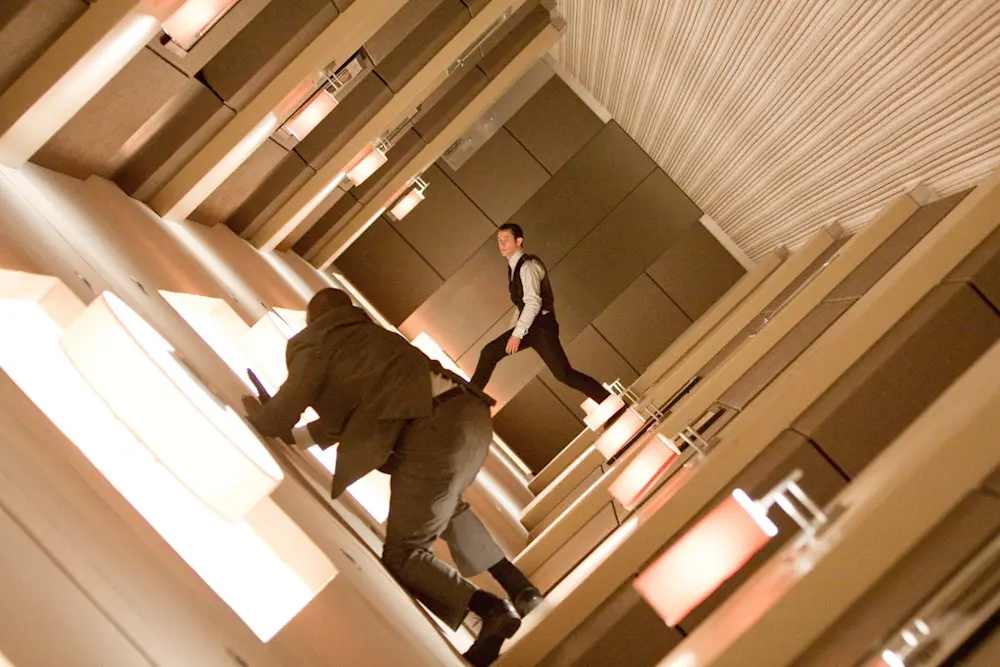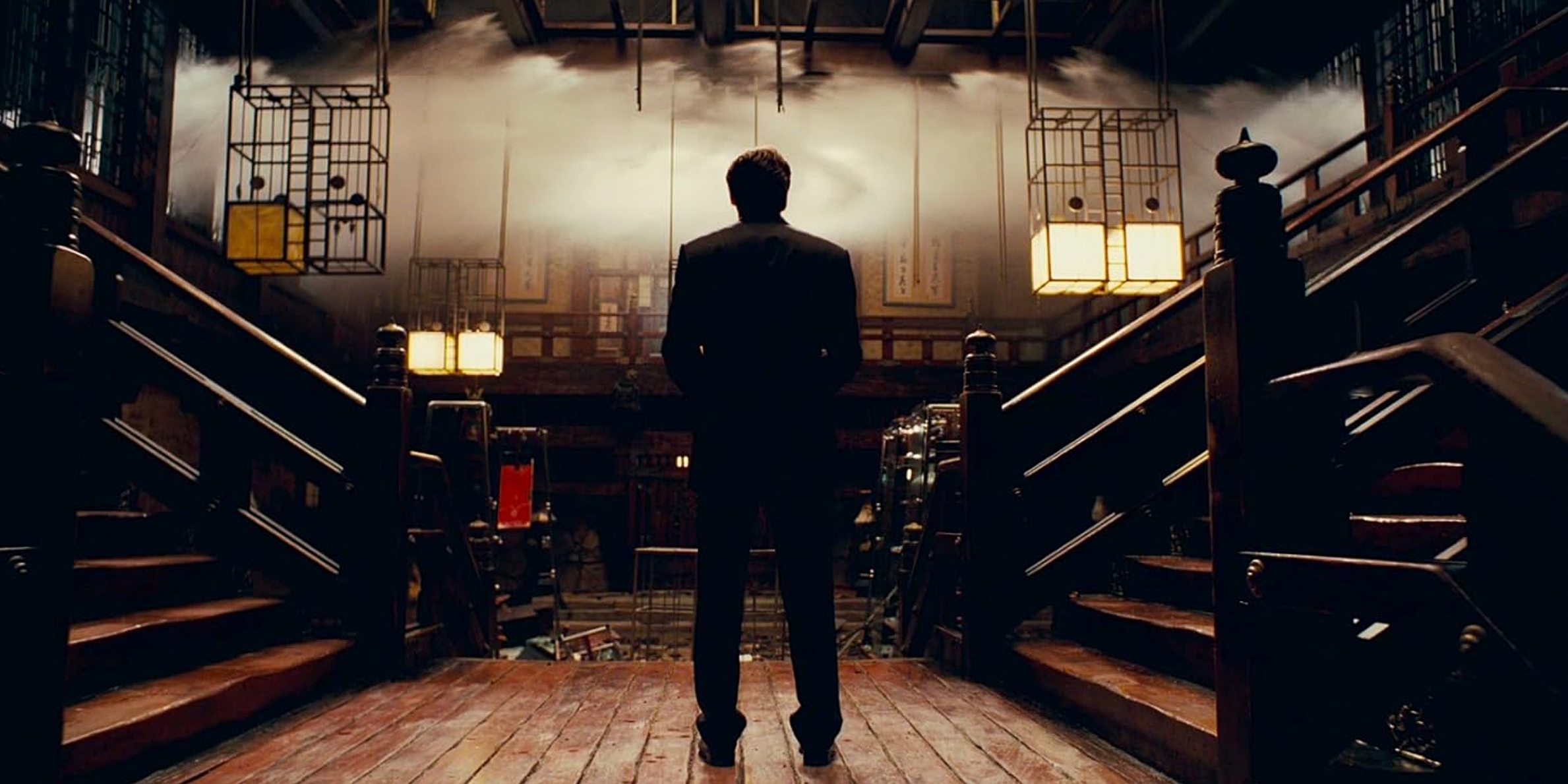Inception | Directed by Christopher Nolan // Starring Leonardo DiCaprio, Joseph Gordon-Levitt, Elliot Page, Tom Hardy, Ken Watanabe, Cillian Murphy, Marion Cotillard, Michael Caine
Set the mood with some music!
Summary (Spoiler-free): Inception is a sprawling, genre-defying heist film built inside a dream. Or rather, many dreams. At its core, it's a story about grief, guilt, and the fragility of memory wrapped in a high-concept sci-fi package with jaw-dropping action, stunning visuals, and a layered narrative structure that dares the audience to keep up.

When Inception came out, I saw it three times in one week, and I don’t think I fully understood it until the fourth. And even then… did I? That’s the beauty of Christopher Nolan’s dream-within-a-dream heist film: it invites you in with the premise of a slick action thriller and then slowly folds in layers of existential dread, philosophical weight, and genuine emotion until you realize you’re in way over your head, and loving every second of it.
Straight up: I adore this movie. Is it perfect? No. Is it overly ambitious? Absolutely. But it swings for the fences with so much confidence, creativity, and technical precision that you can’t help but be pulled into its gravity. For a film that has entire expositional scenes devoted to explaining made-up dream rules, it somehow never loses momentum. It builds and builds — like that braaahm sound in the score — until you’re holding your breath in a collapsing dreamscape and somehow feeling emotionally crushed by a spinning top.
Christopher Nolan is one of the few directors who can take something this complicated and make it feel this cool. Structurally, this movie is a tightrope walk — dreams within dreams within dreams, each with its own timeline and stakes, all running concurrently and cutting between each other in a way that should be confusing but somehow makes sense. That’s not a fluke... that’s meticulous planning, sharp editing, and a director who knows how to juggle plot and pace with total control.
But beyond the structure, Nolan has such an eye for scope. Whether it’s the city of Paris folding in on itself or a zero-gravity hallway fight, everything feels massive and tangible. This doesn’t feel like CGI spectacle for its own sake. It’s grounded in logic (even if it’s dream logic), and every set piece serves the story. It’s a cerebral thriller told with blockbuster scale, and that balance is insanely hard to pull off.
He is also my favorite director ever... if that wasn't obvious from the fact that three of the ten films in my top ten are his films.

Leonardo DiCaprio is at the center of all this chaos, and he’s just magnetic. He brings so much emotional weight to Dom Cobb, a man tormented by guilt, haunted by memory, and desperate for one last shot at redemption. It would’ve been easy to make Cobb cold or clinical, but Leo grounds him with so much pain and weariness. You believe in his obsession because you see how much it’s already cost him.
The supporting cast is just stacked. Joseph Gordon-Levitt is slick and calculated. Elliot Page is the audience’s way in, asking the questions we want to ask. Tom Hardy is just pure charisma. And then there’s Marion Cotillard, whose performance as Mal is one of the most haunting portrayals of grief and projection I’ve seen. She’s not just a villain — she’s a manifestation of loss. Every actor gets their moment, and they all make the most of it.
Hans Zimmer’s score deserves its own paragraph. That bwaaahm sound has become a cultural shorthand at this point, but there’s so much more going on here. The music pulses with urgency, melancholy, and grandeur. It’s orchestral but modern, loud but intimate. The way it plays with Edith Piaf’s “Non, Je Ne Regrette Rien” — slowing it down to match the dream layers — is pure genius. It’s one of Zimmer’s best, and that’s saying something.
The visuals, too, are next level. The hallway fight scene still blows my mind. That was done practically, on a rotating set. No green screen. Just pure movie magic. The dreamscapes themselves range from serene to nightmarish, and the production design gives each layer its own visual identity. You’re never lost. Even as reality starts to blur, the film keeps its grip on you.
This is a film about ideas... literally. About the power of thought, of belief, of memory. It’s about guilt and love and time and control. But it never preaches. Nolan trusts the audience to wrestle with the questions on their own, and that’s part of what makes it stick with you. You walk out of that theater and immediately want to talk about it, to unpack it, to go back in and rewatch it with a new lens.
And that ending — yeah, you know the one. I’ve argued about that ending for over a decade, and I still don’t know what I believe. But that’s the brilliance of it. Nolan doesn’t give you closure because the ambiguity is the point. It’s not about whether the top falls — it’s about the fact that Cobb finally stops watching it.
Inception is one of the most original blockbusters ever made. It’s a rare example of a high-concept, big-budget film that doesn’t dumb itself down — that dares to be challenging, cerebral, and emotionally resonant. I love this movie not just because of its spectacle, but because of its soul. Because beneath all the layers of dreams and rules and timelines, it’s a story about loss, redemption, and the way memory can both haunt and heal us.
I know not everyone vibed with it, and that’s fine. But for me, Inception is a landmark. It’s what happens when a filmmaker trusts their audience to keep up. When a studio takes a risk. When every department, from writing to cinematography to score to acting, is firing on all cylinders. It’s been over a decade since it came out, and I still think about it all the time. That’s how I know it’s one of my all-time favorites. And probably always will be.